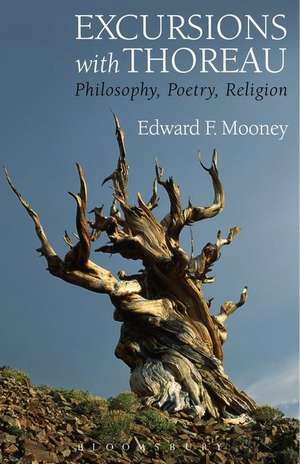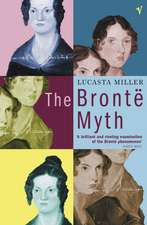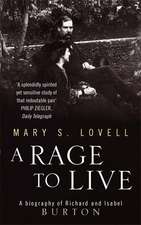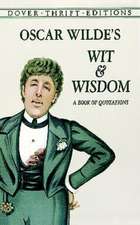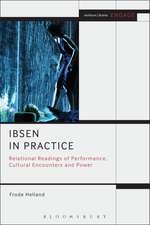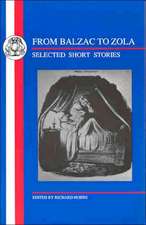Excursions with Thoreau: Philosophy, Poetry, Religion
Autor Professor Edward F. Mooneyen Limba Engleză Paperback – 21 oct 2015
| Toate formatele și edițiile | Preț | Express |
|---|---|---|
| Paperback (1) | 311.16 lei 6-8 săpt. | |
| Bloomsbury Publishing – 21 oct 2015 | 311.16 lei 6-8 săpt. | |
| Hardback (1) | 831.43 lei 6-8 săpt. | |
| Bloomsbury Publishing – 21 oct 2015 | 831.43 lei 6-8 săpt. |
Preț: 311.16 lei
Nou
Puncte Express: 467
Preț estimativ în valută:
59.54€ • 62.33$ • 49.27£
59.54€ • 62.33$ • 49.27£
Carte tipărită la comandă
Livrare economică 05-19 aprilie
Preluare comenzi: 021 569.72.76
Specificații
ISBN-13: 9781501305641
ISBN-10: 1501305646
Pagini: 296
Ilustrații: 2 illustrations
Dimensiuni: 140 x 216 x 20 mm
Greutate: 0.39 kg
Editura: Bloomsbury Publishing
Colecția Bloomsbury Academic
Locul publicării:New York, United States
ISBN-10: 1501305646
Pagini: 296
Ilustrații: 2 illustrations
Dimensiuni: 140 x 216 x 20 mm
Greutate: 0.39 kg
Editura: Bloomsbury Publishing
Colecția Bloomsbury Academic
Locul publicării:New York, United States
Caracteristici
Provides
a
sustained
exposition
and
defense
of
Thoreau's
goal
of
attaining
"sympathy
with
intelligence"
Notă biografică
Edward
F.
Mooneyis
Emeritus
Professor
of
Philosophy
and
Religion
at
Syracuse
University,
USA.
He
is
the
author
or
editor
of
nine
books,
including
Kierkegaard'sRepetition
and
Philosophical
Crumbs(Editor
and
Introduction,
2009),Lost
Intimacy
in
American
Thought(Continuum,
2009),
andExcursions
with
Kierkegaard(Bloomsbury,
2012).
Cuprins
Acknowledgments
Preface
1.
Overture
2.
Celebration
and
Lamentation
3.
Sympathy
with
Intelligence
4.
Concord
Reflections5.
Transforming
Perception6.
Ethics
and
the
Wild7.
Expressive
Bones
8.
Child
of
the
Mist9.
Deaths
and
Rebirths
10.
Affliction
and
Affinity
11.
John
Brown
12.
Souls
in
Infinite
Culture
13.
Currents
of
Time
14.
Grounding
Poetry
15.
Face
of
the
River
Closing
Thoughts
Closing
Images,
Reveries,
Prayers
Closing
Passions
Chronology,
Works
Cited,
Credits
Index
Recenzii
Henry
David
Thoreau
brought
to
philosophical
writing
a
personal
voice
and
a
situated,
embodied
sensibility.
Edward
Mooney
proves
himself
a
worthy
heir
to
Thoreau's
legacy
by
speaking
to
his
readers
as
an
extracurricular
intellectual
and
spiritual
companion.
We
follow
along
as
Thoreauvian
saunterers,
adventuring
through
rich
fields
of
reverie,
with
Mooney
as
our
engaging
and
always
insightful
guide.Excursions
with
Thoreauis
a
powerful
illustration
of
how
philosophy
can
live
up
to
its
name
as
the
love
of
wisdom,
grounded
in
wonder
and
defined
by
transformative
encounters.
It
sheds
new
light
on
the
work
of
a
great
American
philosopher
of
the
nineteenth
century,
and
will
introduce
readers
to
Mooney's
distinctive
mode
of
narrative
reflection
on
human
experience
and
its
meaning.
Without wasting time on the tired question of whether or not Thoreau is a philosopher, Mooney's decisive arguments uncover for us the profundity and strangeness of the thinker's ideas. Mooney carefully and elegantly uncovers a Thoreau who is attentive to questions of life and loss that led him to formulate a complex ethics while rethinking the meaning of the communal. By bringing Thoreau into conversation with such thinkers as Marx and Kierkegaard, Mooney reveals challenges in Thoreau's writings that have still not been sufficiently addressed.Excursions with Thoreauis beautifully written and will be indispensable for future conversations about that writer.
This is, from my point of view, a delightful book. . Mooney is not just interested in explicating Thoreau. The title, Excursions with Thoreau, is meant more seriously. The essays attempt not only to show us Thoreau's way of living, (or, what I called above, his being-in-the-world) but, to some degree, to initiate Mooney himself, and his readers, into that way of life. . Mooney masterfully characterizes the complexity (and sometimes contradiction) that structure these ways of being in the world.
Without wasting time on the tired question of whether or not Thoreau is a philosopher, Mooney's decisive arguments uncover for us the profundity and strangeness of the thinker's ideas. Mooney carefully and elegantly uncovers a Thoreau who is attentive to questions of life and loss that led him to formulate a complex ethics while rethinking the meaning of the communal. By bringing Thoreau into conversation with such thinkers as Marx and Kierkegaard, Mooney reveals challenges in Thoreau's writings that have still not been sufficiently addressed.Excursions with Thoreauis beautifully written and will be indispensable for future conversations about that writer.
This is, from my point of view, a delightful book. . Mooney is not just interested in explicating Thoreau. The title, Excursions with Thoreau, is meant more seriously. The essays attempt not only to show us Thoreau's way of living, (or, what I called above, his being-in-the-world) but, to some degree, to initiate Mooney himself, and his readers, into that way of life. . Mooney masterfully characterizes the complexity (and sometimes contradiction) that structure these ways of being in the world.
